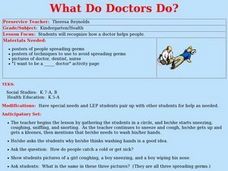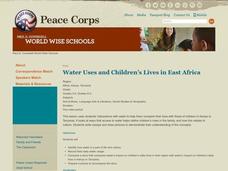Reading Worksheets
Inferences Worksheet 1
Knowing how to make inferences is a very important skill for readers of all ages. Help your pupils master this ability by providing practice. Pupils read four short passages and answer two to three questions about each to practice making...
Dick Blick Art Materials
Mehndi Art Gloves
Class members get a chance to practice the art of Mehndi as they use markets to apply patterns to a latex glove.
Oklahoma State Department of Education
Narrative Prompt
Reading about history is nothing like experiencing it firsthand. Encourage your eighth graders to do the next best thing with a historical narrative prompt, in which they describe the experience of a first-time traveler on the...
University of Florida
Protecting Our Water Resources
Teach young environmentalists to protect their planet's resources with a set of interactive experiments. Kindergartners and other youngsters learn about watersheds and the water cycle, while older elementary learners focus on fertilizer...
Teachnology
Shape (Or Concrete) Poems
Poetry comes in all shapes and sizes. Young writers pick a shape, select words and phrases that describe how the shape makes them feel, and create a shape poem. A raindrop example and step-by-step instructions give your budding poets a...
University of Southern California
Mastering Microbes
Small but mighty! Learners explore the role of microbes in a healthy ecosystem. An engaging lesson asks pupils to design an aquaponics system that demonstrates that healthy microbes are necessary to maintain the ecosystem.
DiscoverE
Slime!!
Who's going to get slimed? Your entire class! Scholars create slime using Borax, water, and white glue. Some food coloring can give the slime a bit of color.
American Museum of Natural History
Be a Water Saver
Everyone must do their part to make a difference. The lesson link provides an 11-item questionnaire to reflect on conservation practices. Simple and straightforward, the lesson is perfect as a remote learning resource or as a tool for an...
Curated OER
What Do Doctors Do?
Students recognize how doctors help people and about germ spreading.
Curated OER
Good Health Manners
Students review what they know about good manners and create a list of good manners. They read a list of good manners and discuss why they are important. They practice good manners and explain how they will keep the flu away.
Curated OER
Working With Environmental Issues
Students begin the lesson by completing a survey about how much and what types of water they drink on a daily basis. Using a worksheet, they calculate the amount of water an American uses each day and the amount their own family uses. In...
Curated OER
Playing With Polymers
Students explore the world of polymers. In this chemistry lesson, students make polymers and observe their properties. Follow-up questions and extension activities are included.
Curated OER
Making soap you can use
Those textbook experiments are no good. Using this simple method you can make a real bar of soap. It's
Curated OER
Water Uses and Children's Lives in East Africa
Learners identify how water use is part of life and culture. Students record their daily water usage and compare results with classmates. Learners complete the graphic organizer on water and children. Students compose an essay, which...
Curated OER
Fruits and Vegetables
Students make a variety of recipes that include fruits and vegetables. In this fruit and vegetables lesson plan, students make recipes, learn about the proper amounts of fruits and vegetables needed per day, describe how to sanitize...
Curated OER
Herb Gardening: Which Herb?
In this herbs worksheet, students play a game where they write the herb and its characteristics after being blindfolded and identifying each herb. Students then answer 1 short answer question.
Curated OER
Growing Tomatoes from Seed
In this growing tomatoes worksheet, learners experience and participate in the process of growing tomatoes over a three or four month span of time. Students follow six directives in producing tomato plants.
Curated OER
Where in the World?
Students evaluate botany by participating in a class discussion. In this agriculture instructional activity, students identify the importance of knowing where food comes from and they discuss what their breakfast consisted of and where...
Curated OER
Taking Apart Electrical Appliances
High schoolers discover that electrical appliances are made up of individual components that work together. They, with partners, demonstrate to others how their piece of equipment or appliance works by taking it apart and examining the...
Curated OER
Kitchen Equip and Lab Procedures - Level I
Students, in groups, record at least four pieces of equipment that fit a specified category as well as a safety tip to observe when using the equipment.
Curated OER
The Internal Anatomy of the Grasshopper
Sixth graders explore the internal organs of grasshoppers. They determine the function of the organs through a dissection activity.
Curated OER
The Dentist
Students read a short story about visiting a dentist. Then they use toothbrushes in order to demonstrate the correct way to brush teeth. Students use the internet to investigate how some foods are healthier for teeth than others. Then...
Curated OER
The Muscle System
In this biology worksheet, 9th graders define striated and identify if the muscles of chicken's leg are striated or smooth. Then they determine how the muscles of a chicken leg are attached to the bones. Students also cut muscles away...
Curated OER
Starch is Everywhere
In this science activity, students add a few drops of iodine solution to each of 10 substances to determine if they contain starch. The iodine will turn blue if the item contains starch.
Other popular searches
- Hygiene Washing Hands
- Nursing Plans Washing Hands
- Sequence of Washing Hands
- Process for Washing Hands
- Washing Hands Clip Art
- Washing Hands Lesson Plans

























